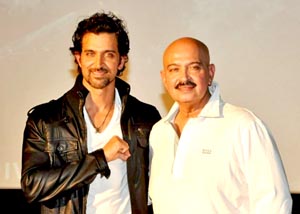New Delhi, May 27: Rakesh Roshan, his wife Pinkie, and their children Sunaina and Hrithik were here in a rarely captured picture perfect moment for the launch of "To Dad, With Love", a pictorial biography on the filmmaker by his daughter. She says once she worked closely with her dad, she realised that "this man needs to be written about".
Sunaina, a cancer survivor who constantly exudes a vibrant smile with a sparkle in her eyes, says it was when she worked with her father as an assistant director for "Krrish 3" that the idea of a book on the actor-filmmaker struck her.
"I saw a different side of him at work. I felt this man needs to be written about to inspire people," Sunaina, the elder of the Roshans' children, said here Monday night.
The book's foreward is written by Hrithik, and their mother Pinkie played a key role in putting the whole idea together.
Sunaina says it is his never-say-die spirit which inspires her the most, and it is his philosophy of "tough times don't last, tough people do", which kept her going when she was ill.
So, once Sunaina decided to embark on the journey of penning a book, based on a gamut of photographs from Rakesh Roshan's childhood to teenage days as well as his days as a young handsome actor, when he turned a husband, father, director and on his journey till now, she touched base with his extended family and friends secretly to get the project going.
There are about 30 people, including names like Shatrughan Sinha, Jeetendra and Rishi Kapoor, to whom Sunaina spoke to for getting the most candid information out about her father.
Sunaina said amongst all, Hrithik was the toughest to get hold of to write the foreward for the book, but when he did, he did it with all his heart.
For Rakesh Roshan, who is known for directing films like "Khoon Bhari Maang", "Karan Arjun", Kaho Naaa Pyaar Hai" and the "Krrisha franchise", it was a proud and happy moment.
On Monday, after Narendra Modi took oath as the country's 14th prime minister, here was Rakesh Roshan attending a launch of a book on himself by his daughter.
"Modi-ji ne kahaa ache din aane waale hain. Mera ache din toh aa gaya (Modi said good days lie ahead, my good day has come) - a daughter is launching a book on her father. What better day to launch it," he said here Monday.
The proud daddy said he was surprised yet proud that Sunaina managed to interview his school friends, teachers and co-actors, and has quoted them "so well" in the book, published by Om Books International.
The family heaped praise on each other's `superhero' abilities at the event, which was also attended by the Roshans' elderly family members. Rakesh and Pinkie were emotional to see them, and went out of their way to greet them.





Comments
Add new comment